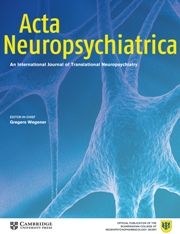
“Cannabidiol (CBD) exhibits significant efficacy in mental and inflammatory diseases. Several studies have recently reported on the rapid antidepressant-like effects of CBD, suggesting that CBD is a potential anti-depressant or anti-stress drug. However, CBD is mainly administered orally or by inhalation with poor bioavailability, resulting in high costs. We aim to explore the efficacy of long-term periodic administration of CBD in chronic mild stress (CMS) via two routes and its pharmacokinetics. We treated ICR mice with CBD administered orally and intravenously and then determined the kinetic constants. A single bolus intravenous injection of CBD resulted in a half-life of 3.9 h, mean residence time of 3.3 h, and oral bioavailability of about 8.6%. The antidepressant-like effects of periodically administered CBD on the chronic mild stress mouse model are evaluated. Results demonstrated that such treatment at a high dose of 100 mg/kg CBD (p.o.) or a low dose of 10 mg/kg CBD (i.v.), elicited significant antidepressant-like behavioral effects in forced swim test, following increased mRNA expression of brain-derived neurotrophic factor (BDNF) and synaptophysin in the prefrontal cortex and the hippocampus. Our findings are expected to provide a reference for the development of intravenous antidepressant formulations of CBD.”
https://www.ncbi.nlm.nih.gov/pubmed/31173966
https://www.sciencedirect.com/science/article/pii/S1382668919300687?via%3Dihub



 “The administration of cannabidiol has shown promising evidence in the treatment of some neuropsychiatric disorders, including cocaine addiction. However, little information is available as to the mechanisms by which cannabidiol reduces drug use and compulsive seeking.
“The administration of cannabidiol has shown promising evidence in the treatment of some neuropsychiatric disorders, including cocaine addiction. However, little information is available as to the mechanisms by which cannabidiol reduces drug use and compulsive seeking. “Bipolar disorder (BD) is a debilitating, lifelong neuropsychiatric illness characterised by unsteady mood states which vacillate from (hypo)mania to depression. Despite the availability of pharmaceutical agents which can be effective in ameliorating the acute affective symptoms and prevent episodic relapse, BD is inadequately treated in a subset of patients.
“Bipolar disorder (BD) is a debilitating, lifelong neuropsychiatric illness characterised by unsteady mood states which vacillate from (hypo)mania to depression. Despite the availability of pharmaceutical agents which can be effective in ameliorating the acute affective symptoms and prevent episodic relapse, BD is inadequately treated in a subset of patients.



